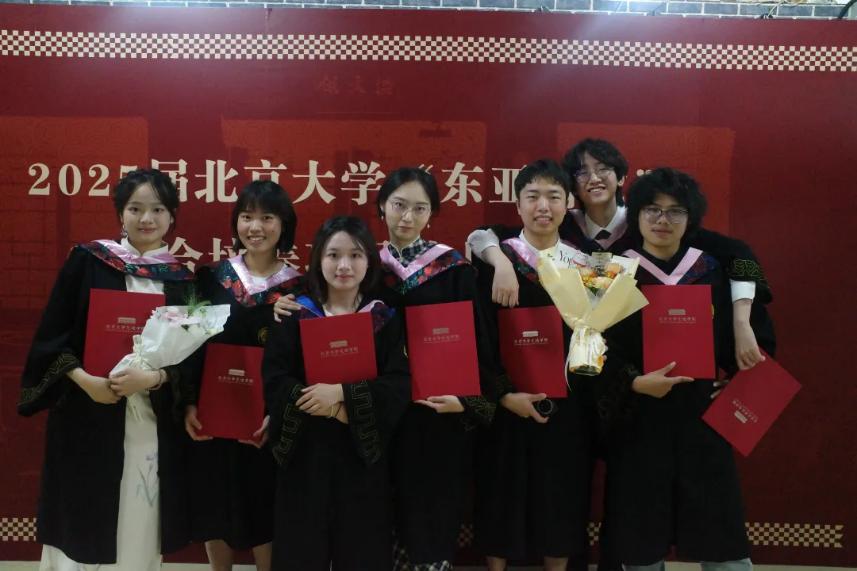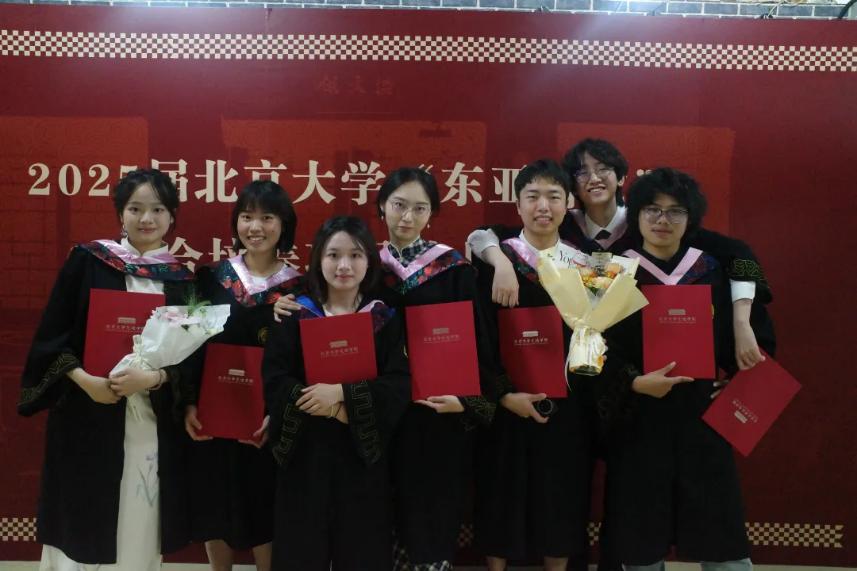
Peking University Class of 2025 "East Asian Studies" Program Completion Ceremony Successfully Held
On the afternoon of June 27, the graduation ceremony for the Class of 2025 of the "East Asian Studies" joint program was successfully held at the Russian Language Building of Peking University. As a signature program of deep cooperation between Chinese and Japanese universities, this ceremony marked the successful completion of studies for the seventh cohort of the "East Asian Studies" program. The ceremony was presided over by Sun Feiyu, Associate Dean of Peking University's Yuanpei College. Attendees included Li Meng, Dean of Yuanpei College; Liu Jianbo, Deputy Director of the Peking University Academic Affairs Department and Associate Dean of Yuanpei College; faculty representatives Zhang Yongle, Ling Peng, and Zhang Fan; as well as Lu Jiao, Deputy Director of the Exchange Program Office of the International Cooperation Department. The atmosphere at the ceremony was solemn yet warm, with the Class of 2025 graduates, new program participants, and numerous faculty members gathering together to witness this important moment.
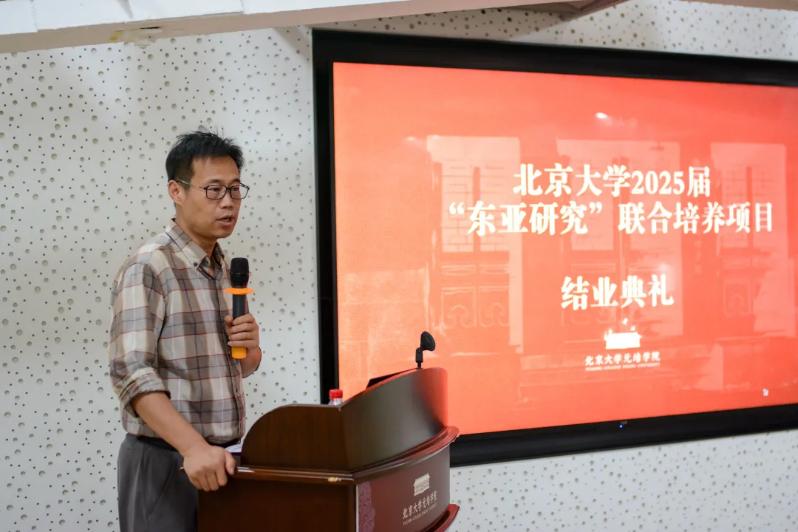
At 14:00 on the afternoon of June 27, Professor Sun Feiyu announced the official commencement of the graduation ceremony and introduced the attending guests in turn.
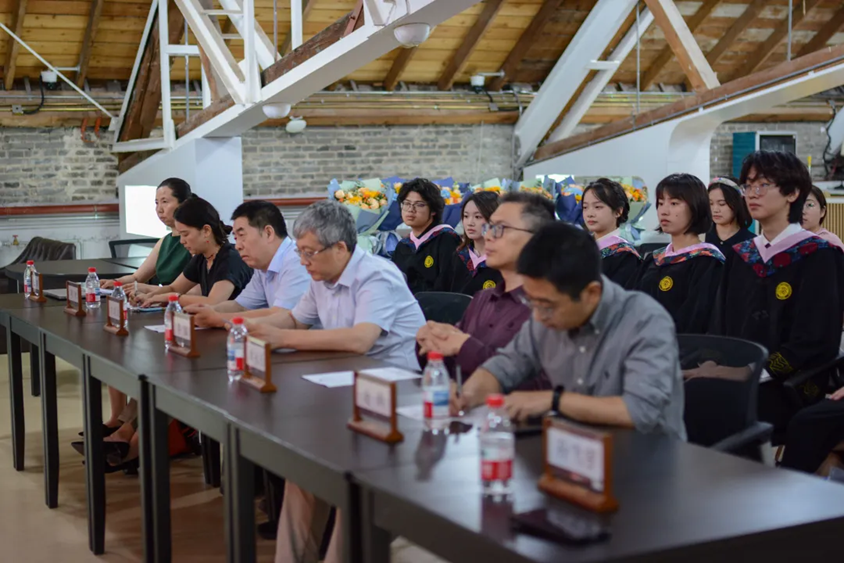
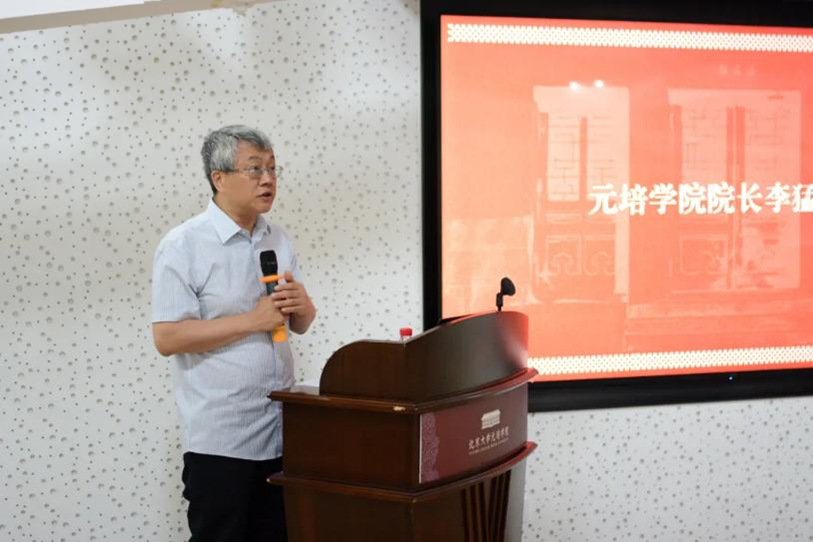
At the beginning of the ceremony, Professor Li Meng, Dean of Yuanpei College at Peking University, extended warm congratulations on behalf of the college to all students who had successfully completed the program. He also expressed sincere gratitude to the Academic Affairs Department, the International Cooperation Department, and the program’s faculty mentors for their dedicated efforts. He reviewed the development of the "East Asian Studies" program since its launch in 2019, highlighting it as a significant achievement of the deep humanities collaboration between Peking University and the University of Tokyo. Over the years, the program has nurtured seven cohorts of students and has increasingly become a signature program of Yuanpei College. Professor Li encouraged the graduates to continue leveraging their cross-cultural and interdisciplinary perspectives, stay engaged with real-world issues, and further integrate East Asian intellectual traditions with modern societal topics in both academic and practical contexts.
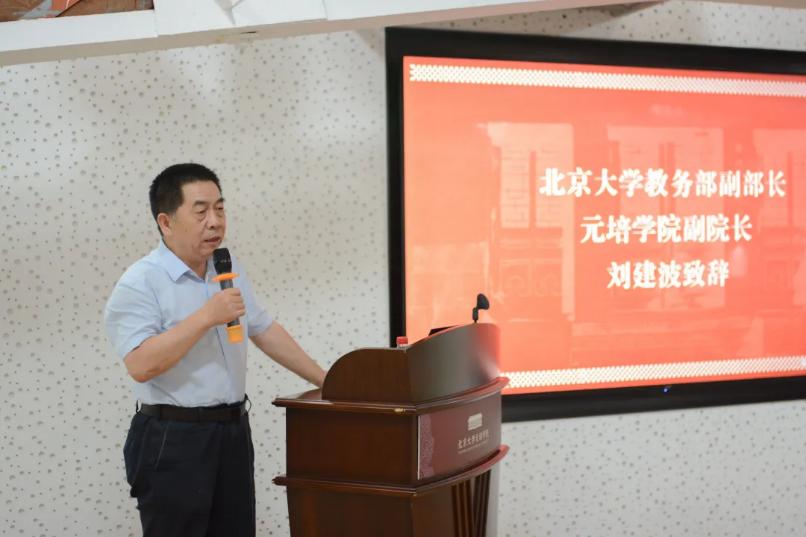
Next, Professor Liu Jianbo, Deputy Director of the Academic Affairs Department and Associate Dean of Yuanpei College, affirmed the unique value of the "East Asian Studies" program from three perspectives: internationalism, interdisciplinary, and practicality. He emphasized that the program provides students with opportunities to study and practice within the academic environments of top universities in China and Japan. Through communication and collaboration across different cultural backgrounds, students have broadened their global vision and developed the ability to address complex challenges. Professor Liu further stressed that interdisciplinary knowledge and cross-cultural communication skills will play a crucial role in the future, as AI technology and social transformations become increasingly intertwined. He encouraged the graduates to apply what they had learned in the program to the broader world and to continue addressing the needs of society through both practice and research.
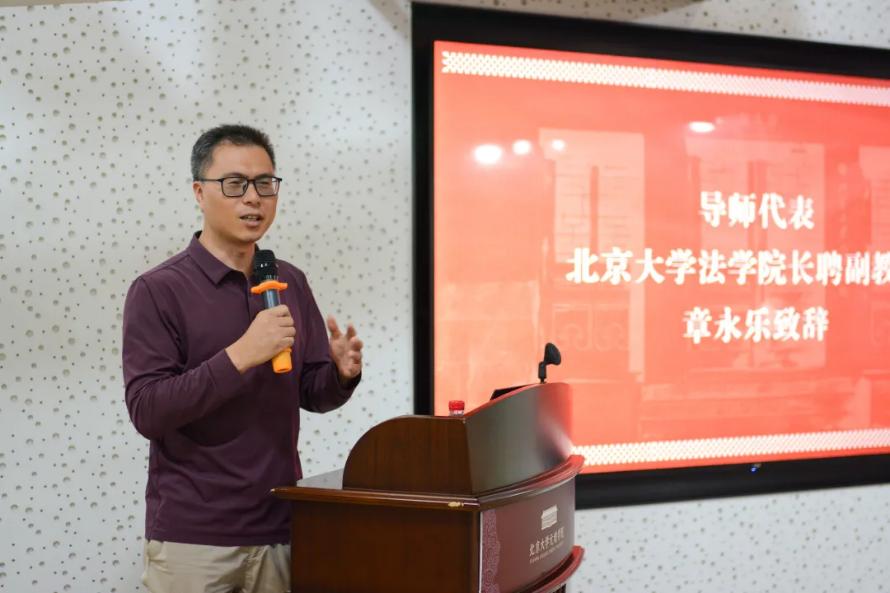
During the mentor address session, three faculty representatives from different disciplines delivered speeches in turn. Drawing from their own teaching and research experiences, and focusing on the students' growth, they highlighted the profound intellectual inspiration fostered by the program.
Zhang Yongle, Tenured Associate Professor at Peking University Law School and Associate Dean of the Institute of Area Studies, began by reflecting on the thousand-year history of Sino-Japanese exchanges. He emphasized the significance of the "East Asian Studies" program in promoting equal dialogue and mutual learning between civilizations. He pointed out that true “intellectual graduation” means possessing a sustained sensitivity to questions and the ability to continually renew oneself. He encouraged the students, whether in academic pursuits or in social practice, to maintain “intellectual self-awareness” and continue contributing to the development of a regional intellectual community.
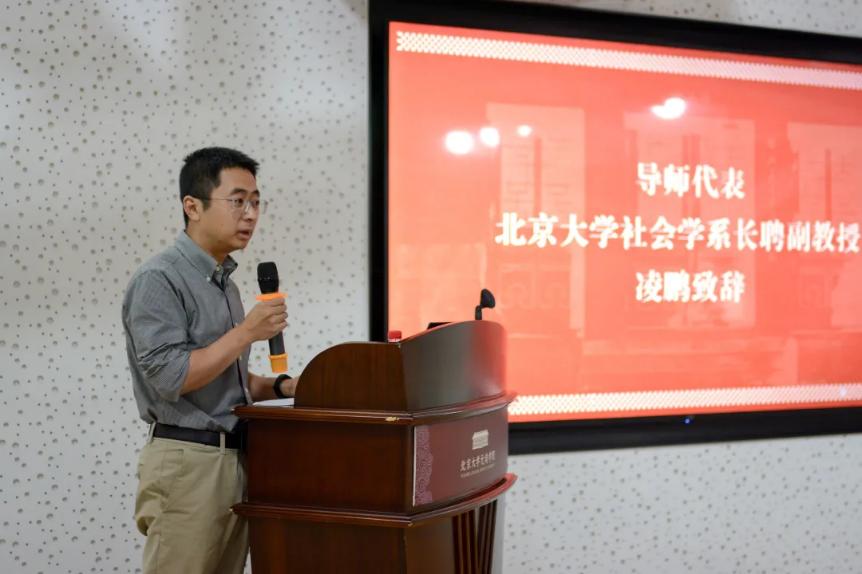
Then, Ling Peng, Tenured Associate Professor from the Department of Sociology at Peking University, drew on his firsthand experience in the program’s research and teaching activities to share how students demonstrated cultural sensitivity and understanding of cultural diversity in practice. He noted that by investigating diverse cultural representations in Japanese society, students not only expanded their own intellectual horizons but also grew more acutely aware that "East Asia" is not a monolithic concept, but rather a dynamic and fluid space full of dynamic interplays. He encouraged everyone to reflect more deeply on their own civilizational traditions through further academic training and historical awareness, and to continue reshaping their cognitive frameworks of "East Asia" in the future.
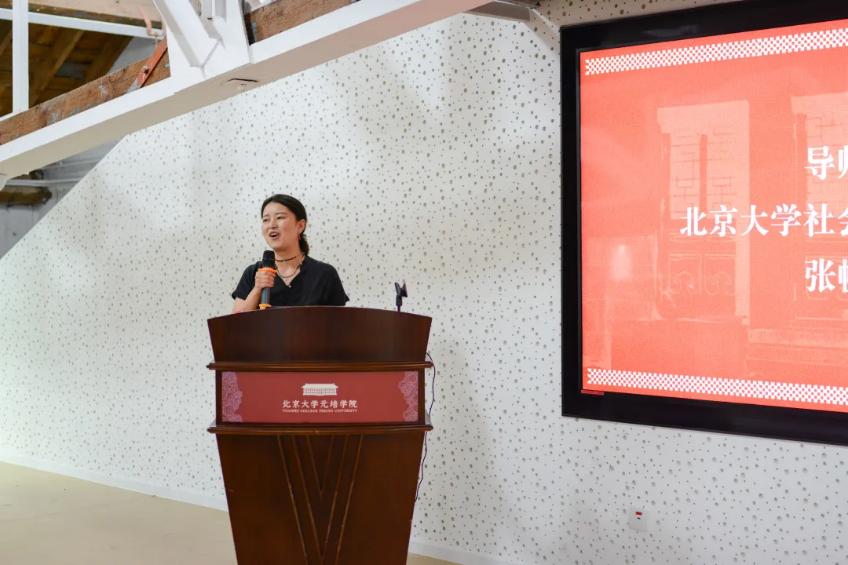
Assistant Professor Zhang Fan from the Department of Sociology at Peking University drew upon her teaching and field research experiences, reflecting on moments spent with students during activities such as post-disaster field research in Tokyo. She noted that the students' capacity for critical reflection and their enthusiasm for discussion when confronted with major social issues provided her, as an educator, with new inspiration. She particularly emphasized that it is precisely this "sense of community" nurtured through interdisciplinary dialogue that has transformed the program into an intellectual space transcending specific academic disciplines and stimulating collective reflection. Professor Zhang expressed her belief that this experience will continue to exert a lasting influence on the students' future lives and research endeavours.
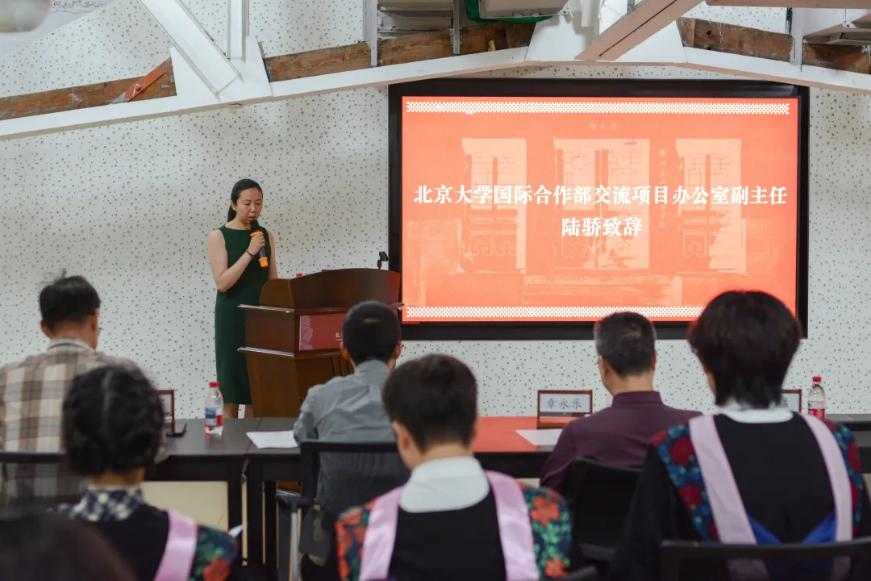
On behalf of the International Cooperation Department, Professor Lu Jiao delivered a speech, noting that since its launch in 2019, the "East Asian Studies" program has become a significant platform for strategic collaboration between Peking University and the University of Tokyo. She emphasized that the program’s educational goal is to cultivate young talents rooted in East Asian civilization and equipped with a global perspective, and she highly praised the outstanding performance of this year’s graduates in coursework, faculty-student interactions, and offline exchanges. In her concluding remarks, she encouraged the graduates to always embody the spirit of the program—whether they choose to pursue further studies or engage in social practice—and to continue contributing to the peace, mutual understanding, and development of the East Asian region.
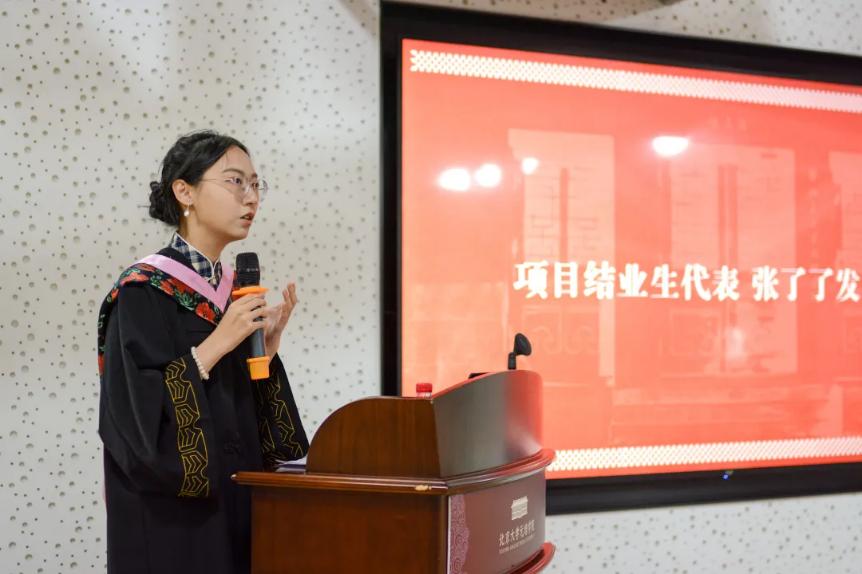
Following the addresses from faculty representatives, Zhang Liaoliao, graduate from the “East Asian Study” Class of 2025 and majoring in History enrolled in 2021, shared reflections on her personal growth and gains throughout the program. She highlighted that the most valuable asset of the program was the “space for exploration”— under the collaboration of different disciplines and cultures, students expanded their cognitive boundaries and learned to understand others and themselves amidst differences. She emphasized that the essence of the "East Asian Studies" program lies in dialogue and openness, which break down the barriers between academic disciplines and geographical regions, bringing together individuals through intellectual connections and deepening mutual understanding while discovering new possibilities through continuous engagement. She expressed special gratitude to all the teachers who contributed to the program and concluded with a quote from Max Weber’s “Science as a Vocation,” expressing her aspiration for continued exploration and growth in the future: “to set to work and meet the ‘demands of the day’—in human relations as well as in our vocation. This, however, is plain and simple, as long as each finds and obeys the demon who holds the fibres of his very life.”
After the addresses concluded, Associate Dean Sun Feiyu of Yuanpei College read out the list of graduates of the Peking University Class of 2025 "East Asian Studies" Program. A total of 10 students from the program had successfully completed all required courses as stipulated by the curriculum, thereby fulfilling the program's requirements.
The attending faculty members then presented the graduates with honorary certificates and commemorative gifts. The Peking University Class of 2025 East Asian Studies Program Completion Ceremony was then officially concluded.
